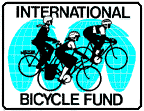Africa:
Bicycle & Non-Motorized Transport

![]() IBF is 100%
IBF is 100%
solar powered
![]()
Bicyclist's Dilemma In African Cities
Guide to Travel In Africa by Bicycle
African emergency inner tube patch kit: Calotropis procera
Bicycle Advocacy Organizations In Africa
Language In Cross-cultural Understanding Reviewing language for racial and cultural bias.
Organization Collection & Shipping Bicycles to Africa
Overview of Textiles In Africa (mostly handmade African cloth)
Pan-Africa Bicycle Information Network
Pan-Africa Bicycle Information Conference Jinja, Uganda, November 2002
Transportation Bicycles & Development: Progression or Regression
Women For Sustainable Development (Tunisia)
15 Myths of Bicycling In Africa
Sustainable Society: Articles on: Non-Motorized Nairobi, Pedalising Eritrea, Foundation For Urban and Rural Advancement (Uganda).
Africa News Background and Resources
IBF's Africa / Bicycle / Development Bibliography / Reading List
Sub Saharan Africa Transport Program As of late 1993 the World Bank was suppose to be beginning to develop a new policy on transport in Africa. The program was being coordinated through the Sub Saharan Africa Transport Program (SSATP).
Phase I of the Urban Transport Component (UTC) identified severe supply constraint of public transport, the inadequacy of urban infrastructure and lack of appropriate urban transport policy in African cities as the focus was on motorized supply.
Phase II of the UTC is a study on non-motorized transport. Surveys are now being carried out simultaneously by a French team working in Mali, Senegal and Burkina Faso, and a Dutch team working in Tanzania and Kenya. The objectives are to: identify constraints to bicyclists and pedestrians; determine the elements of the cycle experience in Asian cities which could help to develop these modes in Africa; develop action programs for non- motorized transport in the case study cities; develop a non- motorized urban transport strategy for African cities and a program of dissemination; and provide specific detailed recommendations for the design of non-motorized facilities in the African context.
The study does not seem to look at land use patterns in African or Asian cities or to address the fact that most African cities were designed by Europeans or European trained planners and that the problem might be in part land-use based.
Another component of SSATP, the Rural Travel & Transport Project (RTTP), is working on guidelines for intermediate transport (i.e. bicycles, tricycles and trailers). The RTTP has produced a technical paper (#161) "Intermediate Means of Transport in Sub-Saharan Africa," available from World Bank.
Home | About Us | Contact Us | Contributions | Economics | Education | Encouragement | Engineering | Environment | Bibliography | Essay Contest | Ibike Tours | Library | Links | Site Map | Search
![]()
The International Bicycle Fund is an independent, non-profit organization. Its primary purpose is to promote bicycle transportation. Most IBF projects and activities fall into one of four categories: planning and engineering, safety education, economic development assistance and promoting international understanding. IBF's objective is to create a sustainable, people-friendly environment by creating opportunities of the highest practicable quality for bicycle transportation. IBF is funded by private donation. Contributions are always welcome and are U.S. tax-deductible to the extent allowed by law.
![]()
![]() Please write if you have questions, comment, criticism, praise or
additional information for us, to report bad links, or if you would like to be
added to IBF's mailing list. (Also let us know how you found this site.)
Please write if you have questions, comment, criticism, praise or
additional information for us, to report bad links, or if you would like to be
added to IBF's mailing list. (Also let us know how you found this site.)
